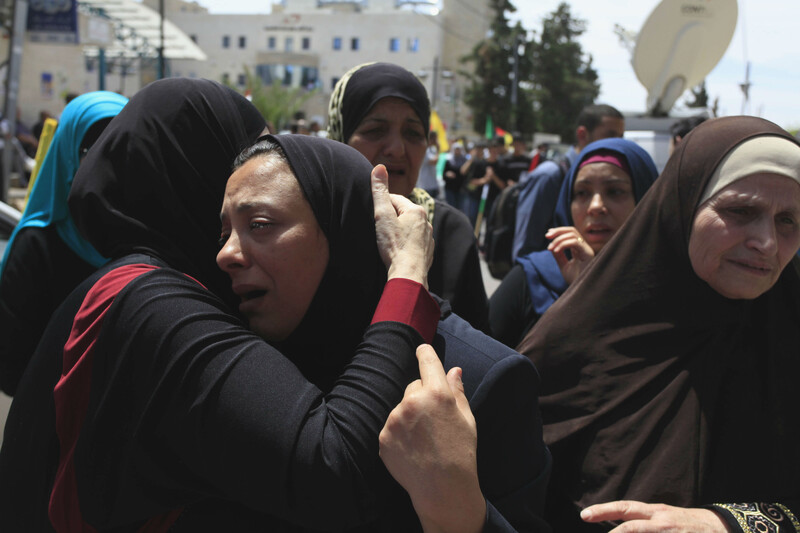Rights and Accountability 30 May 2014

Relatives mourn during the funeral of 16-year-old Muhammed Abu al-Thahir, one of two teens shot and killed on 15 May by Israeli forces.
APA imagesAs The Electronic Intifada has extensively reported, Israel occupation forces shot and killed two Palestinian teens on 15 May during a protest in the occupied West Bank.
Nadim Nuwara, 17, and Muhammad Abu al-Thahir, 16, were both shot with live ammunition outside of Israel’s Ofer military prison, near the occupied West Bank city of Ramallah. Their killings were caught on tape by CNN, and the human rights group Defence for Children International - Palestine Section also released a video composed of footage captured by nearby security cameras.
The United Nations and the United States have called on Israel to conduct a transparent investigation, and Palestinian, Israeli and international human rights groups have roundly denounced the killings. In response, Israel initially offered a number of bizarre and immensely improbable explanations for their deaths: that Palestinians killed them; that Israeli forces did not fire live ammunition that day; and that the video footage was likely “forged.”
Speaking to Wolf Blitzer at CNN, Michael Oren, former Israeli ambassador to the US, claimed that “we don’t know … for certain” that Nuwara and Abu al-Thahir had even died.
On Wednesday 28 May, the military provided its first official comment to the Israeli daily Haaretz.
Dismay
The mainstream media covered the boys’ killings widely. But Nadim Nuwara’s family expressed dismay that Palestinian children killed by Israel were often turned into statistics and robbed of their personalities, as they told me in an article for The Electronic Intifada.
On the morning of 29 May, I spoke to the Subaahal Muslim program on the South Africa-based Radio Islam International about Israel’s killing of the boys and the systematic impunity Israeli soldiers after brutalizing or killing Palestinians, including children. I would like to point out that Sulaimaan Ravat, the interviewer, mistakenly said that the Israeli military found the soldier suspected of “misusing” his weapon as “not guilty.” However, according to the Haaretz report, the military is still engaged in an investigation and has suspended the soldier in question for the time being.
In any case, as I noted in the interview, Israeli soldiers and settlers who commit acts of violence against Palestinians are rarely punished, if reprimanded at all.
The audio of this radio interview is below, along with a rush transcript.
Sulaimaan Ravat: Fourteen minutes till 8, we cross over now to Ramallah, where we are joined on the line by an independent journalist and frequent contributor to The Electronic Intifada, Patrick O. Strickland. Patrick, thank you so much for your time, much appreciated, good morning and welcome.
Patrick Strickland: Good morning and no problem at all.
SR: Well, we were talking earlier on and we made reference to this article you have written for The Electronic Intifada – “Who made the bullet that killed sports-loving Palestinian boy ‘in cold blood’?” For those not in the loop, Patrick, as to what happened exactly to young Nadim Nuwara, give us a brief summary of the events that led to his death.
PS: Okay, well on the 15th of May, as Palestinians do every year, they gathered to commemorate the Nakba, the 1948 ethnic cleansing of Palestine that led to the establishment of Israel. And Nadim and another child – Nadim was 17 years old – and Muhammad Abu al-Thahir – he’s 16 years old – were both killed at one of these demonstrations at an Israeli military prison here in the occupied West Bank near Ramallah. Afterwards, there has been a series of evasions and explanations and so on, but basically the article is about his family [the Nuwara family] trying to get some kind of justice for him.
SR: Now has there been any indication as to whether the Israelis are willing to take responsibility? I’ve read an article that mentions that CNN footage shows a soldier firing. That soldier was suspended but subsequently found not guilty because the army insists that he was firing only rubber bullets. Even though it was reported he was unauthorized to do so [because] he was a non-combatant soldier at the time. But has there been any willingness from their side to take responsibility for these live rounds that have been fired?
PS: No, not in any serious sense. Of course, up until last night the Israeli military had not provided any official statement, but had floated a number of explanations or possible explanations in the media. Saying that it was possibly Palestinians who shot these young boys, saying that they hadn’t used live ammunition, saying that the videos were possibly forged. Those videos of course were released by CNN as well as a number of Israeli and Palestinian human rights groups.
Until last night there had been no kind of official response. Last night it was revealed in the Israeli daily Haaretz that the soldier who fired at the same time Nadim Nuwara was shot had used his weapon in violation of the code of conduct for the Israeli military. But still there has been no kind of serious indication that there is any responsibility being taken, and even in that article the Israeli military is saying at best that it was only rubber-coated steel bullets and that there’s no way to prove that that’s [the Israeli soldier’s use of his weapon] what caused the death of Nadim Nuwara.
SR: It is very interesting that the other youngster was killed, according to one of the reports we read, one hour later in more or less the same spot.
PS: Right, yeah, Muhammad Abu al-Thahir, the same thing essentially. The only difference is that Nadim was shot from the front and at a downward angle, according to the medical reports we obtained from Ramallah Hospital, and Muhammad Abu al-Thahir was shot from behind and the bullet reportedly went right through his heart.
SR: Now, you’ve met with the family and as you said, your article is based around their expression of grief and their quest to get some sort of justice. Tell us about what was forthcoming from their side during your interaction.
PS: Well, essentially they expressed dismay that mainstream media coverage of this has more or less turned the kids into statistics. Of course, Nadim Nuwara and Muhammad Abu al-Thahir were both children with likes and dislikes and dreams and goals and friends and peculiarities and personalities that were unique and so on. And one of the things that they said, is that this is a problem that kids are transformed into numbers, especially Palestinian children.
SR: It was interesting to read that this young man [Nadim Nuwara] while growing up had had two near-death experiences already.
PS: Yeah, his father explained that when Nadim was born he had some sort of medical complications that led doctors to believe that he wouldn’t make it. But in the end, he did survive. Then again in the third grade he was hit by a car and was in critical condition for some time, but also pulled through.
SR: Based on your experience – you are in Ramallah, Patrick – how do Palestinians react to this? Naturally, there is that period of grief, there’s that period of expressing anger, but do you get the impression that it kind of solidifies their resolve to continue with the struggle.
PS: Well, no doubt yes. In the cases of Nadim Nuwara, who is from Ramallah, and Muhammad Abu al-Thahir, who is from the nearby village of Abu Schedem, there has been, I would say, more anger than usual.
With these two deaths, according to Defense for Children International – Palestine Section, that’s four children so far this year that have been killed by the Israeli military with live ammunition. And that makes it over 1,400 that have been killed [by Israel] since the year 2000. During that period, according to Yesh Din, an Israeli human rights groups, there has been only 16 indictments against Israeli soldiers.
So that obviously leads people to think that, okay, the international community is not going to do anything, and you obviously cannot trust Israel to conduct a fair investigation itself, or the Israeli military. You have this kind of feeling of anger, and I think that drives people to want to take the issue into their own hands.
SR: Do you think, Patrick, that the story has the ability or it has somehow touched people that could result in some sort of international interest and focus that would be sustained and as a result put some pressure on the Israeli army to at least make an acknowledgement?
PS: I would say that obviously because this made it into CNN and other mainstream media outlets across the world, including The New York Times, there has been an increase, or more international interest than normal. But in terms of the Israeli army taking any kind of responsibility, I’d just say no … that there is a climate of impunity for Israeli soldiers as well as Israeli civilians who kill Palestinians, including children.
What that translates into for Palestinians is that children are regularly beaten, arrested, detained, interrogated and killed as well, of course.
SR: Finally Patrick, on a slightly different and more general note, we know that the Pope made a visit to the area, how was this received in Ramallah?
PS: I’d say in Ramallah, with more or less indifference. The Pope didn’t come to Ramallah as far as I know, or if he did it was in a meeting with the Palestinian Authority. But I imagine that there was some sort of excitement in Bethlehem and the surrounding areas where he visited.
I know that Nadim and Muhammad’s parents both appealed to the Pope to visit them and to watch the videos of their childrens’ deaths, but that there was no response from the Pope.
SR: Alright Patrick, thank you so much for your time this morning and for the update. Much appreciated.
PS: Thank you.






Comments
Killing at Tapuah
Permalink Elisabeth replied on
At a Dutch site a commenter noted that the killing of a Palestinian at the Tapuah Junction two days ago was committed by the same soldier who already killed a Palestinian at the same place in 2013. (According to Wallah.)
In 2013 the story was that the Palestinian had used 'an improvised weapon'. (He was standing at a bus stop with a box of firework and one went off apparently.)
Here is that story:
http://www.haaretz.com/news/di...
This time it is said that the Palestinian attacked with a hand gun, but his family says that he was waiting for a delivery of merchandise for his phone shop and was shot as soon as he came out of the taxi that brought him there.
At at the Dutch site there is a picture of Mohammed Alaa Odeh (the man that was killed recently) in front of his phone shop. He seems proud of his shop and he had two little daughters. I find it very hard to believe that this man was a 'terrorist' who went out to kill.
The same soldier killed twice with the same excuse at the same place. The first time he was not punished, and so he killed again. And seeing the picture in Haaretz, Ganz thanked him for it. Here is the picture:
http://www.haaretz.com/news/na...